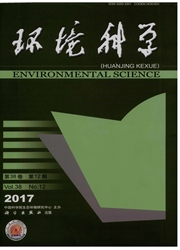

 中文摘要:
中文摘要:
利用电子自旋共振-自旋捕集技术(ESR)研究了不同条件下Fenton和类Fenton反应中羟基自由基的变化规律.结果表明,Fenton和类Fenton在起始反应阶段羟基自由基的生成速率都随着H202和Ve^3+或Fe^2+浓度的增大而增大,但Fenton反应在起始阶段羟基自由基生成速率显著高于类Fenton反应.Fenton反应pH在2.5~3.5,而类Fenton反应pH在2.8~3.0范围内有较高的自由基生成速率.起始反应完成后,反应过程中Fenton与类Fenton反应自由基的生成速率也存在显著差异.结果表明,两体系在反应起始和反应过程中都存在着机制的差异.
 英文摘要:
英文摘要:
The production of ·OH radicals was investigated by using the electron spin resonance (ESR) method with 5,5-dimethyl 1 lpyrroline-l-oxide (DMPO) as spin trap reagent. ESR signals composed of 4 lines with a 1 : 2 : 2 : 1 intensity ratio indicated the formation of ·OH radicals in the Fenton-like reaction. For both systems, the production rates of hydroxyl radicals in the initial stage were considerably high, and increased with increasing concentrations of I-I202 and Fe2 + or Fe3 ~ . However, the radical production rate in Fenton reaction system was markedly higher than that in Fenton-like reaction under similar dosing conditions. The differences of radical production rates between the reaction systems remained even in the slow reaction stage. The optimum pH ranges of the production of · OH radicals in Fenton process and Fenton-like process were 2.5- 3.5 and 2.8- 3.0 respectively. The above results demonstrate that the Fenton system and Fenton-like system are possibly based on different reaction mechanisms.
 同期刊论文项目
同期刊论文项目
 同项目期刊论文
同项目期刊论文
 期刊信息
期刊信息
